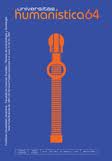Abstract
This article constitutes a historical account of the development of modern schooling, with a prime emphasis on the epistemological changes that took place in Europe in the seventeenth and eighteenth century. While earlier historians who focused on this same period presented a benevolent account of the growth of modern schooling, I adopt a more critical view. As I demonstrate in this article, characteristics such as a fragmented disciplinary curriculum; a privileging of rational and objective knowledge codified in book form; a mechanistic view of the natural environment as detached and wholly different from human nature; and a totalizing pedagogy that controls every moment and movement of students, were all features that emerged during this time frame and became an integral part of the ethos and organization of modern schooling. With this article I hope to contribute to our understanding of how the school as an institution was carved into the modern psyche with such potency that it overshadowed most other forms of the intergenerational transmission of culture.
This journal provides immediate open access to its content on the principle that making research freely available to the public, encourages greater global exchange of knowledge.
The journal Universitas Humanística is registered under a Creative Commons Attribution 4.0 International Public License. Thus, this work may be reproduced, distributed, and publicly shared in digital format, as long as the names of the authors and Pontificia Universidad Javeriana are acknowledged. Others are allowed to quote, adapt, transform, auto-archive, republish, and create based on this material, for any purpose (even commercial ones), provided the authorship is duly acknowledged, a link to the original work is provided, and it is specified if changes have been made. Pontificia Universidad Javeriana does not hold the rights of published works and the authors are solely responsible for the contents of their works; they keep the moral, intellectual, privacy, and publicity rights.
Approving the intervention of the work (review, copy-editing, translation, layout) and the following outreach, are granted through an use license and not through an assignment of rights. This means the journal and Pontificia Universidad Javeriana cannot be held responsible for any ethical malpractice by the authors. As a consequence of the protection granted by the use license, the journal is not required to publish recantations or modify information already published, unless the errata stems from the editorial management process. Publishing contents in this journal does not generate royalties for contributors.


